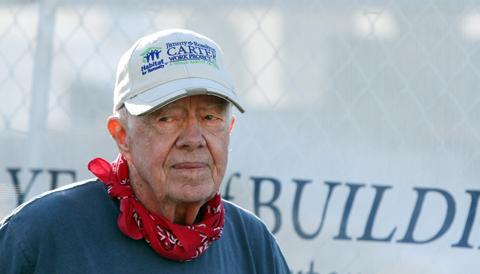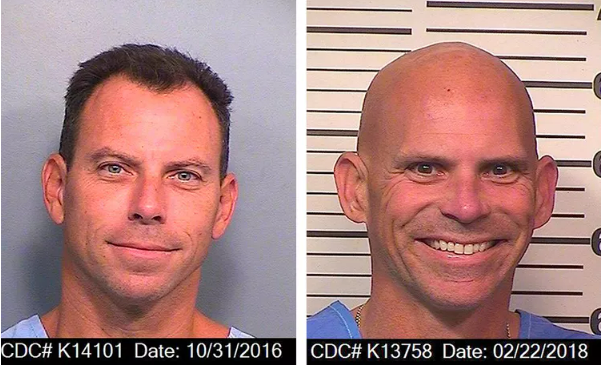Former President Jimmy Carter Stays Resilient While Facing Cancer
While the Iran Hostage Situation Marred His Presidency, Carter’s Post-Presidency Works Have Earned Him Worldwide Admiration

MARK R. SULLIVAN/STAFF PHOTOGRAP
Former President Jimmy Carter remains busy with his humanitarian projects such as Habitat for Humanity even though he is battling cancer.
Jimmy Carter is a prime example of a warhorse. He still plays a large part in humanitarian efforts and in American politics, even at the ripe old age of 90 and with a severe case of melanoma, which is the most dangerous form of skin cancer.
On Aug. 12, Carter had a small mass of a tumor on his liver surgically removed to see what was wrong. The scans at Emory University revealed that he had four spots of metastatic melanoma in his brain, which means that it spread from the source to other parts of the body. Jimmy Carter had been undergoing radiation treatments for the past weeks and will continue to do so over three week intervals.
Carter is also being treated with one of the newest cancer-fighting drugs available called Keytruda. The drug has only been available for a year according to Tim Turnham, executive director of the Melanoma Research Foundation, so the results are uncertain.
Aside from what is the equivalent of brain cancer, Jimmy Carter is stated to be in good health, so his 90-year old body should be able to handle the ongoing radiation treatments and immunotherapy that he is going through. While Jimmy Carter has stated on Aug. 28 that he might have only weeks to live (it could vary depending on the treatments), he doesn’t succumb to self-pity; instead, he stays completely at ease and continues his daily routine of charity work and other humanitarian efforts at home and abroad. “I’m ready for anything, and I look forward to a new adventure,” is what Carter said during one of his interviews, never letting a smile fade from his face.
Jimmy Carter was the 39th president of the United States, serving a single four-year term from 1977 to 1981. The 1960’s and 70’s were difficult times for America. From things such as the Vietnam War, governmental reluctance towards passing equal rights bills, the Watergate scandal, and plenty of other cultural and political issues, the American people became deeply distrustful of Washington and corrupt politicians.
During the 1976 presidential race, Jimmy Carter was fairly anonymous, even more so than the other Democratic candidates. He used this to his advantage. Since the population was fed up with establishment politicians, Carter declared himself a man of the people and pledged to never tell a lie, never avoid a controversial issue, and fix the nation’s economic problems.
His time in office is one that is deeply criticized and often poorly regarded amongst many people, but he did accomplish his fair share of good in office. For example, he helped end a war and dissolve tension between Egypt and Israel by laying the groundwork to get representatives from both of nations to end hostilities and normalize relations. Since then, Israel and Egypt have been friendly with each other and have not entered into an armed conflict with each other in over 36 years, despite obvious turmoil in that region.
Carter also created the Department of Education and the Department Energy that has lasted to this day. He also signed two treaties with the president of Panama in 1977 that guaranteed Panama control over the American-controlled Panama Canal territories (although they would have gained the territories back in 1999 anyway) and allowed Panama the right to defend the canal from any threat.
Carter has also enacted energy conservation policies that have led to upgrades to technology, and hewas a huge promoter of human rights at home and abroad, a cause in which he is still very active despite his melanoma.
As a president, Jimmy Carter had accomplished many great things that still impact society to this day, but many of those deeds are overshadowed by other unfortunate occurrences that have affected his reputation has president negatively. When the Soviet Union invaded Afghanistan in 1979, Jimmy Carter had the U.S. boycott the 1980 Moscow Olympics. This affected many athletes negatively who had worked very hard for their Olympic dream, only to be told that they could not participate.
The major oil, energy, and economic problems were also detriments to Carter’s presidency, problems Carter had inherited and tried to fix, but with little success. He created the Department of Energy, and the economy was improving (for a while), but the oil problem was something he could not solve. His policies ended up making oil more expensive and unfortunately was not very effective.
The darkest moment of Carter’s presidency, however, was the Iranian hostage crisis. When U.S. embassy staffers in Iran were taken captive, Carter tried to solve the issue diplomatically with no success. The diplomatic stalemate led to the launching of Operation Desert One, a military rescue effort to get the hostages out. However, strong winds caused a sandstorm in the desert launching areas, which led to the helicopters malfunctioning and even crashing. The hostages were eventually released on the day of Ronald Reagan’s (Carter’s successor) inauguration.
During a recent speech, Carter looked back on the rescue attempt disaster and said he should have done more, adding, “I wish I had sent one more helicopter to get the hostages, and we would have rescued them, and I would have been re-elected.”
Carter may not have been the most effective president, yet he is still held in high esteem for his post-presidential work which many believe overshadows his accomplishments as president and proves that people out of power can do more than some people with power. He and his wife, Rosalyn Carter, have been doing work for the Habitat for Humanity charity organization since 1984, building homes for the under-privileged.
Carter has also been working on fighting Guinea Worm. Considered a neglected tropical disease, Guinea worm disease is a parasitic infection caused by the nematode roundworm parasite. It is contracted when people consume water from stagnant sources contaminated with Guinea worm larvae. Guinea worm is a particularly devastating disease that incapacitates people for extended periods of time, making them unable to care for themselves, work, grow food for their families, or attend school.
In 1986, the disease afflicted an estimated 3.5 million people a year in 21 countries in Africa and Asia. Today, thanks to the work of The Carter Center and its partners — including the countries themselves — the incidence of Guinea worm has been reduced by more than 99.99 percent to 126 cases in 2014.
Because of the efforts of the Carter Center, the world is very close to eradicating the disease completely. Carter recently said, “I want the last guinea worm to die before I do.”
Carter has managed to establish a village-based healthcare delivery system in thousands of communities in Africa. He has also managed to convince Kim II Sung of North Korea to discontinue that country’s nuclear weapons program in the 90’s and has furthered peace in many war torn nations such as Libya and Bosnia.
Still playing a part in American politics today, Carter has acted as a de facto ambassador of sorts for different countries and provides his take on the goings on in the world today. He has also tried to advance efforts to improve mental health and erase the negative outlook on people with mental illnesses. He has pioneered a new public health system created to deal with dangerous neglected diseases in Latin America and Africa.
Jimmy Carter, above all else, is a champion of human rights. He provides aid to anyone he can and fights for the equality of all people, regardless of race, nationality, or religion. Back in 1971 when Carter was inaugurated as the governor of Georgia, he demonstrated his support for equal rights in his address by saying, “I say to you quite frankly that the time for racial discrimination is over.”
There are presidents out there that have lived life to the fullest after their term(s) were over, but none quite as grandly as Jimmy Carter has. He has spent the majority of his life helping people. Even with lethal melanoma nipping at his heals, he still maintains his calm and collective attitude and never drops his positive attitude.
No one knows what the future has in store for Jimmy Carter; at this point, the treatments could work or they could be ineffective, but either way he’s going to keep his daily routine. His current condition could lead to more awareness to melanoma and maybe even a cure for the disease. He is a man that shows us that we don’t need to be a leader of a country to get things done and that hard work and a good attitude can get results. No matter what people say about his single term in office, he has done more to promote human rights and help others than most, and that won’t be forgotten.










